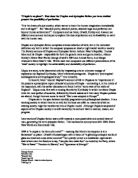"Do you begin to see, then, what kind of world we are creating? It is the exact opposite of the stupid hedonistic utopias that the old reformers imagined." Discuss the anti-utopia that Orwell is portraying with reference to totalitarian regimes.
“Do you begin to see, then, what kind of world we are creating? It is the exact opposite of the stupid hedonistic utopias that the old reformers imagined.” Discuss the anti-utopia that Orwell is portraying with reference to totalitarian regimes.
Hitler, Stalin and Big Brother, tyrants all. Throughout Nineteen-Eighty Four, there are clear similarities between Winston’s world and the totalitarian regimes that now form part of our history. However, as O’Brien goes on to explain, there are just as many differences.
The concept of a ‘utopia’ was defined, although not invented, in a sixteenth century essay by Thomas More describing a perfectly ordered world wit complete equality. AS O’Brien expresses, this was the initial aim of the ‘old reformers’; indeed, the concept of communism in Russia and China, in its origins, seems closely linked to the principles of Utopia. While O’Brien may simply be referring to More in his dismissal of ‘stupid hedonistic utopias,’ totalitarian dictators such as Hitler, in principle at least, did have this aim in his quest for the augmentation of the German State. In this respect Big Brother has learnt both from literature and history.

This is a preview of the whole essay
Peer Reviews
Here's what a star student thought of this essay
Quality of writing
The Quality of Written Communication is fair and the candidate makes no large errors. There are however, frequent typing errors and oft some grammatical misprints of words like with the sentence "not surprise in a state which removes one's individually" which should read "Not surprising in a state which removes one's individuality". Errors like these feature throughout this essay, and whilst they are no hugely compromising of the clarity of what the candidate is trying to say, they are too frequent to not mention. I recommend a thorough read-through for any candidate - we all make errors, the majority of them without even realising, and these cannot be left to slip past final proof-reads and spell-checks that even computer can sometimes miss.
Level of analysis
The Level of Analysis shown by this candidate is very good. It is not regimented or overly prescriptive, and nor does it feel confined by the simplicity of the PEE/C (Point, Evidence & Explanation/Comment) formula. That isn't to say that PEE/C isn't a winning method, as it can score very highly, but to reach the upper limits of the grade boundaries, I recommend something slightly more naturally flowing, like this essay. There are clear analytical points with embedded quotes to back them up (embedded quotes are useful because they greatly enhance to fluidity of the analysis), and there are insightful and interesting comments drawing comparisons between The Party/Big Brother and historical leaders of dictatorships, and the candidate is careful to ensure they do not make any comparative errors through a profound knowledge of the novel and the motives of O'Brien, The Party and Big Brother. It is important to have extensive knowledge of the novel in question, because examiners can always tell whether the candidate does or not, and it reflects very badly if errors are made.
Response to question
This is not an easy essay to tackle, but this candidate makes a stellar attempt. Through a sensitive appraisal of historical facts about totalitarian dictators like Hitler, Stalin, and Franco, the candidate is equipped to argue the differences and similarities between these past dictatorships and the one Orwell presents as 'The Party' in his novel 'Nineteen Eighty-Four'. They chose well to explicitly link features of The Party's rule to history through direct comparisons, as it does make the task much easier and a lot more organised. The structure of the answer is very well done, with the candidate's essay flowing beautifully through it's analysis. There is no definitive 'order', but it does read fluently and each paragraphs feels nicely rounded off before beginning a new chapter of analysis. Candidates are marked on their structure by examiners, and such a coherent, cohesive answer structured so well will only guarantee high marks for the ability to write a good essay.








